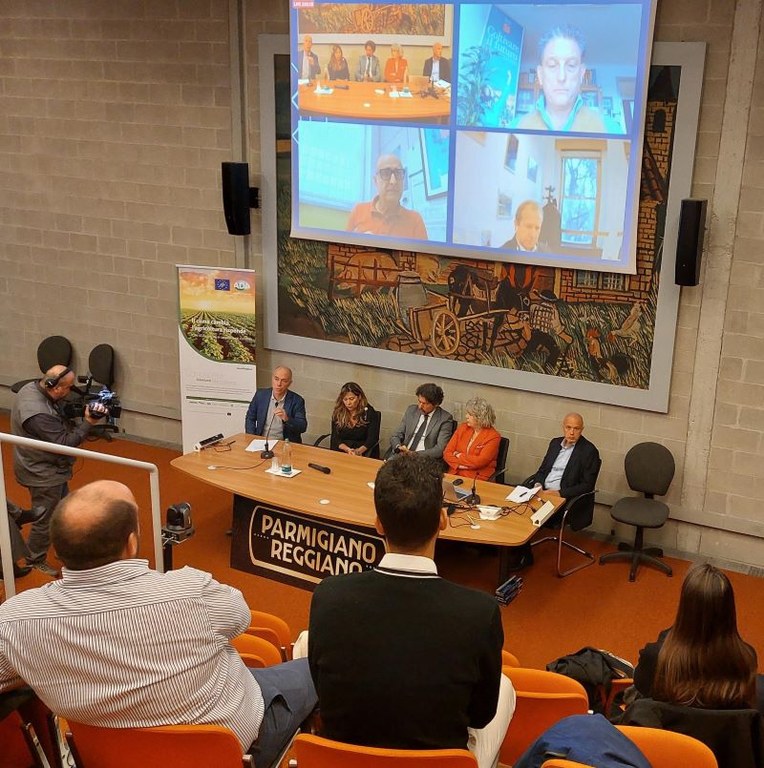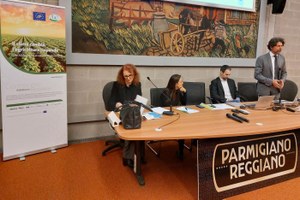The challenges for the dairy supply chain toward climate change
The second workshop organized by the Region within Life Ada project (ADaptation in Agriculture), which is funded with Life programme of the European Union, was held in Reggio Emilia on October, 30 in the headquarters of Parmigiano Reggiano Consortium.
The focus was the dairy sector and in particular the Parmigiano Reggiano Dop supply chain, considering its crucial importance in Emilia-Romagna, the pilot region of the project. The Head of the Consortium Deserti during his welcome speech pointed out how in the reform of the European system of Geographical Indications (the new regulation is expected in a few months), the Commission incorporated the request of higher flexibility and waivers were accepted in the event of adverse meteorological events. Taking into account that 20% of Parmigiano Reggiano PDO has the optional indication "mountain product", it is clear how a significant share of production can be influenced by extreme events.
The General Director of Agriculture Mazzotti recalled the importance of the dairy supply chain in the regional economy: Emilia-Romagna is the second region in terms of number of animals raised, with a production value of 1,500 million euros which represents quarter of PLV (gross salable production). Of the 2.3 million tons of milk produced, the majority is for processing, especially in the Parmigiano-Reggiano PDO supply chain.
The threats deriving from the effects of so-called climate changes in this supply chain are mainly of 2 types:
- The increasing average temperatures, especially in summer, leads to a condition of stress in the cows (some breeds, such as the Friesian, originate from cool or even cold climates), which can lead to a drop in production;
- The availability of forage grown in the production area, as required by the specifications, is also influenced by climate change and extreme events such as drought or heavy rainfall, which are equally harmful.
As recalled by the representatives of Unipol Sai, leader of Ada, the main objectives are: 1) improving the knowledge of scenarios and risks for key supply chains in relation to the climate; 2) building tools that help producers create adaptation plans; 3) maintain insurability in the agricultural sector in a very difficult period, reducing the risk with prevention. 60 agricultural companies and 7 producer organizations were involved in the pilot testing phase of the Ada Tool web application.
The data from the Nomisma survey conducted on the stakeholders of the dairy supply chain (Consortium and 4 producing dairies, of which 2 in the plains, 2 in the hills and one organic) were then presented: the main issue is the need to comply with specifications about the percentage of self-produced fodder to feed animals, a risk that mainly concerns farms in the hills and mountains.
Other events that threaten the productivity of the supply chain are: heat waves, which are handled by installing cooling systems in stables and nebulizers; sudden frosts, against which generators are effective to heat water.
Looking at prevention, technological and process innovation is crucial in the agricultural sector, in fact in the 2023-2027 planning 5% of the total resources have been allocated for this purpose, and in the previous planning, several funded projects of the Operational Groups for Innovation focused, for instance, on irrigation efficiency, fodder and thermal stress.
 During the round table of the second part of the event, Producer Organizations, certification bodies and other Italian regions had the chance to share their experience and their point of view.
During the round table of the second part of the event, Producer Organizations, certification bodies and other Italian regions had the chance to share their experience and their point of view.
The representative of Lazio Region, where the important Pecorino Romano Dop comes from, recalled that over 30 million euros were allocated for natural disasters compensation in recent years and appreciated the opportunity to exchange of experiences between regions and with protection consortia and other stakeholders.
The representative of Veneto recalled the importance of mutual funds, an innovative passive defense tool that is still little known and too little used, while the representative from Tuscany reiterated the need quickly modify the product specifications to respond promptly in a dynamic context.
In his final speech, Deserti focused on the role of the Protection Consortium in preventing market crises and natural disasters: thanks to the investments of producers, and also public funding, the risks have been reduced; Parmigiano Reggiano, therefore, can also be a model for other supply chains.
Check the complete workshop program (377.47 KB).
Click to download the presentations:
- Climate change and the insurance sector: Life ADA project (
765.96 KB) (G. Balugani);
- Life ADA project: implementation status and future objectives (
766.32 KB) (S. Faccioli);
- ADA tool: the new free web app to support agricultural companies in tackling climate change (
2.73 MB) (A. Tirri);
- Main evidence on risk management methods and tools in agriculture in the Emilia-Romagna dairy supply chain (
806.7 KB) (F. Lunati).

